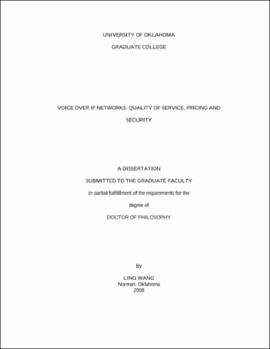| dc.contributor.advisor | Verma, Pramode K. | |
| dc.creator | Wang, Ling | |
| dc.date.accessioned | 2019-06-03T20:35:28Z | |
| dc.date.available | 2019-06-03T20:35:28Z | |
| dc.date.issued | 2008 | |
| dc.identifier | 99175151402042 | |
| dc.identifier.uri | https://hdl.handle.net/11244/320204 | |
| dc.description.abstract | The growth of the Internet over the past decade together with the promise of lower costs to the customer has led to the rapid emergence of Voice over Internet Protocol (VoIP). As a real-time application in large scale packet switched networks, VoIP networks face many challenges such as availability, voice quality and network security. This dissertation addresses three important issues in VoIP networks: Quality of Service, pricing and security. | |
| dc.description.abstract | In addressing Quality of Service (QoS), this dissertation introduces the notion of delay not exceeding an upper limit, termed the bounded delay (rather than the average delay), to measure the Quality of Service in VoIP networks. Queuing models are introduced to measure performance in terms of bounded delays. Closed form solutions relating the impact of bounding delays on throughput of VoIP traffic are provided. Traffic that exceeds the delay threshold is treated as lost throughput. The results addressed can be used in scaling resources in a VoIP network for different thresholds of acceptable delays. Both single and multiple switching points are addressed. The same notion and analysis are also applied on jitter, another important indicator of the VoIP QoS | |
| dc.description.abstract | This dissertation also develops a pricing model based on the Quality of Service provided in VoIP networks. It presents the impact of quality of VoIP service demanded by the customer on the transmission resources required by the network using an analytical approach. The price to be paid by the customer is based on the throughput meeting this criterion and the network transmission resources required. In particular, the impact of Quality of Service presented can be used in the design of VoIP networks in a way that would provide fairness to the user in terms of quality of service and price while optimizing the resources of the network at the same time. | |
| dc.description.abstract | This dissertation also extends and applies the delay throughput analysis developed for VoIP networks in assessing the impact of risks constituted by a number of transportation channels, where the risk associated with each channel can be quantified by a known distribution. For VoIP security, this dissertation mainly focuses on the signaling authentication. It presents a networking solution that incorporates network-based authentication as an inherent feature. The authentication feature that we propose introduces a range of flexibilities not available in the PSTN. Since most calls will likely terminate on the network of another service provider, we also present a mechanism using which networks can mutually authenticate each other to afford the possibility of authentication across networks. Finally, this dissertation explores areas for future research that can be built on the foundation of research presented. | |
| dc.format.extent | 150 pages | |
| dc.format.medium | application.pdf | |
| dc.language | en_US | |
| dc.relation.requires | Adobe Acrobat Reader | |
| dc.subject | Internet telephony--Quality control | |
| dc.subject | Computer network protocols--Quality control | |
| dc.subject | Internet telephony--Prices | |
| dc.subject | Computer networks--Security measures | |
| dc.title | VOICE OVER IP NETWORKS: QUALITY OF SERVICE, PRICING AND SECURITY | |
| dc.type | text | |
| dc.type | document | |
| dc.thesis.degree | Ed.D. | |
| ou.group | College of Engineering::School of Electrical and Computer Engineering | |
